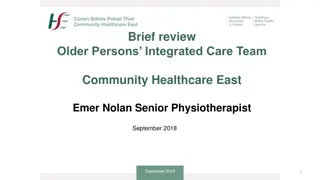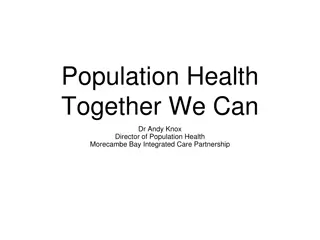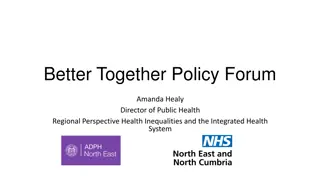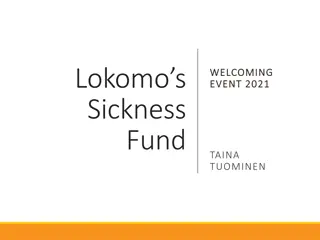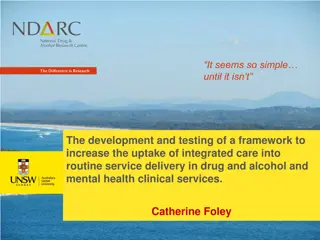Better Care Fund for Integrated Health and Social Care Improvement
The Better Care Fund aims to address the challenges posed by an aging population and increased demand for healthcare services in England. By promoting an integrated approach between health and social care services, the fund focuses on improving care coordination, resource utilization, and outcomes for users. Pooled budgets enable a coordinated effort to deliver care tailored around individual needs, enhance service availability throughout the week, reduce hospital visits, and achieve better overall outcomes for patients. Local leaders play a crucial role in driving these transformative changes to benefit patients, families, carers, and staff.
Download Presentation

Please find below an Image/Link to download the presentation.
The content on the website is provided AS IS for your information and personal use only. It may not be sold, licensed, or shared on other websites without obtaining consent from the author. Download presentation by click this link. If you encounter any issues during the download, it is possible that the publisher has removed the file from their server.
E N D
Presentation Transcript
Integration and Improvement Better Care Fund Andrew Webster Director Integrated Care Local Government Association
Challenge Between 2010 and 2030, England s population is forecast to age rapidly. Tight local government settlement in 2015/16 (2.3% reduction in overall local government spending). Looking ahead, the LGA estimates (2012) that spending on adult social care will pass 45% of council budgets by 2019/20 leading to a 4bn gap over the next Parliament Those aged 65 and over are projected to grow at over four times the rate of those aged under 65. The number of very old people (those aged over 85) is projected to double. NHS spending On assumptions of flat funding going forward and services continuing to be delivered in the same way as now, would result in a funding gap which could grow to 30 billion between 2013/14 to 2020/21. The number of people with multiple long- term conditions will increase from 1.9 million in 2008 to 2.9 million people in 2018 Integration Transformation Fund
Benefits Coordinated approach Better use of resources Organised around users Services 7 days a week Bring skills together around the user Reduction in need to go to hospital Better outcomes for users
The Better Care narrative The Better Care Fund is one of the most concrete steps ever towards making this change happen everywhere. This is the start and pooled budgets are here to stay. There is consensus that to respond to this care should be organised around the person who needs it, and that person s care team should work together to keep them better for longer. Plans have been approved in almost all areas and the task now is to ensure that all are as strong as possible to kick start the change we need from next April. NHS and social care services are now caring for people with increasingly complex needs and multiple conditions. As ever with system transformation success depends on the people who are leading it to make it happen locally people taking bold steps to move away from their old ways It is challenging, and will undoubtedly get harder before it gets easier but we have seen in small pockets the immense value of the prize for patients, users, families, carers and staff. Now we want this to happen everywhere and we are committed to support local areas to achieve this. Local Government and NHS leaders have a crucial part to play. The BCF has accelerated and made happen conversations that have never happened before about joint working across agencies.
Details of the Fund The June 2013 SR set out the following: 2014/15 2015/16 An additional 200m transfer from the NHS to social care, in addition to the 900m transfer already planned 3.8bn pooled budget to be deployed locally on health and social care through pooled budget arrangements In 2015/16 the BCF will be created from the following: 1.9bn NHS funding 1.9bn based on existing funding in 2014/15 that is allocated across the health and wider care system. Composed of: 130m Carers Breaks funding 300m CCG reablement funding 354m capital funding (including c. 220m of Disabled Facilities Grant) 1.1bn existing transfer from health to social care of which 135m is for Care Act Costs in 2015/16 Integration Transformation Fund
Conditions on the Fund Content of the plans In general, the content of the plans will be locally agreed, but there will be some nationally mandated elements. These will include: plans to be jointly agreed; protection for social care services (not spending); As part of agreed local plans, 7 day working in health and social care to support patients being discharged and prevent unnecessary admissions at weekends, aligned to; better data sharing between health and social care, based on the NHS number ensure a joint approach to assessments and care planning; ensure that, where funding is used for integrated packages of care, there will be an accountable professional; risk-sharing principles and contingency plans if targets are not met including redeployment of the funding if local agreement is not reached; and agreement on the consequential impact of changes in the acute sector. The 3.8bn pooled budget will only be released to local areas with agreed plans for how it will be used 1bn of the funding will be linked to outcomes achieved Payment for performance Payment will be based on achieving an agreed reduction in emergency hospital admissions. To have full discretion over deployment of funding, local areas will need to meet their planned outcomes. Where emergency admissions are reduced by less than 3.5% localities must allocate the balance of the 1bn to NHS Commissioned services to reduce hospital admissions. Integration Transformation Fund
Full picture of current approval statuses Currently there are 120 areas fully approved and 4 approved with support. 21 areas remain subject to conditions and 5 areas remain not approved pending the outcome of wave 3. Phase 1 results: October 14 Wave 1: 28 Nov 12 Dec Wave 2: 12 Dec 9 Jan Wave 3: 09 Jan 03 Feb Summary 99 6 120 99 Approved Approved formally approved plans following wave 1 3 88 120 Approved with support Approved with support formally approved plans following wave 2 4 6 91 3 5 18 30 remaining plans will seek full approval during wave 3 Approved with conditions Approved with conditions 3 40 1 48 21 NCAR Wave 3 results to BCF Prog. Board on 03 Feb 5 5 5 Not Approved Not Approved NCAR
Have any key features of the fund changed? The overall size of the fund is 5.3bn this has fallen by 4.7m, but this is not significant on the headline size of fund Expenditure from the fund has shifted towards Social Care and Community Health, reflecting Hertfordshire s re-categorisation of ~ 200m of Other expenditure : Acute (- 3.7m) Primary Care (+ 0.4m) Mental Health (- 3m) Social Care (+ 132m) Community Health (+ 76m) Other (- 204m) Continuing Care (- 0.7m) Non-elective reductions have fallen by 2397 stays. HWBs are now planning to reduce non-elective admissions by 160,765 or 3% (down by 0.07%) Delayed transfers of care reductions have fallen slightly 3026 days. HWBs are now planning to save 97,936 days or 7.2% (down by 0.3%) Reductions in residential admissions have fallen from 1,948 to 1,851 (ie 97 more patients will be admitted into residential care than in the September plans). Reablement has improved with46 more people a year will remain at home within 3 months of discharge compared to the September plans. This is driven by primarily by Cumbria 9
Five things were learning from better care Catalyst accelerates in many places, can distract more established arrangements - serious shared intent Plan for all - needs more involvement and commitment from hospitals and GPs serious shared endeavour Money matters - save to spend means that the risks come first and the benefits later shared risk management Overcoming barriers most places are confident about enablers shared services becoming business as usual Time is of the essence - deadline has brought focus, delivery needs sustained effort over years - needs 5 yr commitment
Wider policy context Care Act Implementation Health and Care Integration Pioneers Five Year Forward View
What next? Will need a clear policy on existing funding going forward into 2016/7 Metrics and conditions could be amended Options for next parliament unlikely to be informed by evaluation of 2015/6 BCF could be part of a bigger programme of integration and joint budgets Important decisions on social care arrive very early in next parliament






















